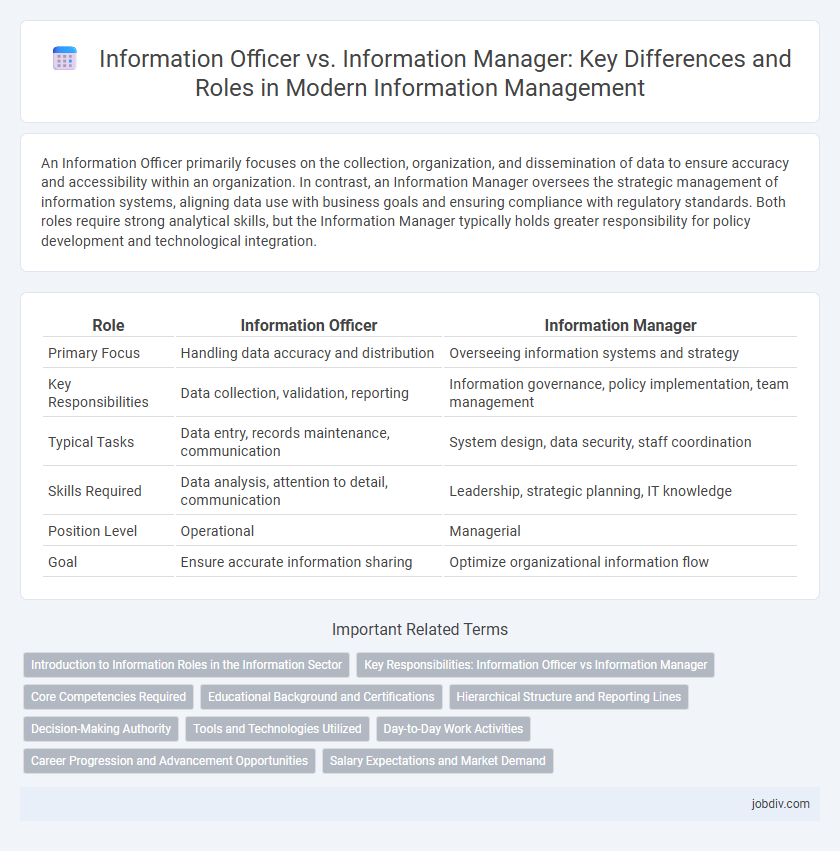An Information Officer primarily focuses on the collection, organization, and dissemination of data to ensure accuracy and accessibility within an organization. In contrast, an Information Manager oversees the strategic management of information systems, aligning data use with business goals and ensuring compliance with regulatory standards. Both roles require strong analytical skills, but the Information Manager typically holds greater responsibility for policy development and technological integration.
Table of Comparison
| Role | Information Officer | Information Manager |
|---|---|---|
| Primary Focus | Handling data accuracy and distribution | Overseeing information systems and strategy |
| Key Responsibilities | Data collection, validation, reporting | Information governance, policy implementation, team management |
| Typical Tasks | Data entry, records maintenance, communication | System design, data security, staff coordination |
| Skills Required | Data analysis, attention to detail, communication | Leadership, strategic planning, IT knowledge |
| Position Level | Operational | Managerial |
| Goal | Ensure accurate information sharing | Optimize organizational information flow |
Introduction to Information Roles in the Information Sector
Information Officers oversee the collection, management, and dissemination of data to ensure accurate and timely communication within organizations. Information Managers coordinate information systems, develop policies, and supervise teams to optimize the retrieval and security of data assets. Both roles are critical in the information sector for maintaining data integrity and supporting decision-making processes.
Key Responsibilities: Information Officer vs Information Manager
Information Officers are primarily responsible for managing data collection, ensuring information accuracy, and facilitating communication between departments to maintain data integrity. Information Managers oversee the strategic planning, implementation, and governance of information systems, focusing on data security, policy compliance, and optimizing information flow across the organization. The key distinction lies in the Information Officer's operational role in handling and disseminating information versus the Information Manager's responsibility for strategic oversight and management of information resources.
Core Competencies Required
Information Officers require strong skills in data collection, analysis, and accurate reporting to ensure effective communication and compliance with information policies. Information Managers focus on strategic planning, information governance, and overseeing information systems to optimize organizational data handling and security. Both roles demand proficiency in information technology, data privacy regulations, and stakeholder management to maintain information integrity and accessibility.
Educational Background and Certifications
Information Officers typically hold a bachelor's degree in information science, communications, or a related field, with certifications such as Certified Information Professional (CIP) enhancing their expertise. Information Managers often pursue advanced degrees like a master's in information management or business administration, alongside certifications including Project Management Professional (PMP) and Certified Information Systems Manager (CISM) for superior leadership and strategic skills. The educational background and certifications of each role align with their core responsibilities, emphasizing operational knowledge for Information Officers and managerial capabilities for Information Managers.
Hierarchical Structure and Reporting Lines
An Information Officer typically operates at an operational level, managing day-to-day data collection, processing, and dissemination, and reports directly to the Information Manager or department head. The Information Manager holds a higher hierarchical position, overseeing the strategic planning, implementation, and coordination of information systems across departments, and reports to senior management or CIOs. Clear reporting lines ensure that Information Officers align their tasks with broader organizational goals set by Information Managers, enhancing data governance and communication efficiency.
Decision-Making Authority
An Information Officer primarily handles data collection and dissemination with limited decision-making authority, focusing on accuracy and compliance. An Information Manager holds broader decision-making power, overseeing information strategy, resource allocation, and ensuring alignment with organizational goals. The distinction lies in the scope of authority, where managers influence policy and strategic decisions, whereas officers execute established information processes.
Tools and Technologies Utilized
Information Officers primarily utilize data management systems, content management platforms, and communication tools to collect, organize, and disseminate information efficiently within organizations. Information Managers typically employ advanced analytics software, enterprise resource planning (ERP) systems, and business intelligence tools to analyze data trends, optimize information workflows, and support strategic decision-making. Both roles rely on cybersecurity measures and cloud technologies to ensure secure and accessible information storage and sharing.
Day-to-Day Work Activities
An Information Officer primarily handles data collection, processing, and dissemination to ensure accurate and timely information flow within an organization. An Information Manager oversees information systems, develops data management strategies, and coordinates teams to optimize information usage for decision-making. Both roles require strong communication skills, but the manager typically focuses on strategic planning and system improvements, while the officer emphasizes operational tasks.
Career Progression and Advancement Opportunities
Information Officers typically focus on managing data accuracy and communication flow, serving as the entry point in information-related careers. Advancement to an Information Manager role involves overseeing information systems, strategy development, and leading teams, reflecting increased responsibility and leadership scope. Career progression from Officer to Manager is marked by enhanced technical skills, decision-making authority, and broader organizational impact.
Salary Expectations and Market Demand
Information Officers typically earn between $50,000 and $70,000 annually, reflecting mid-level responsibilities in data management and communication. Information Managers command higher salaries, ranging from $75,000 to $110,000, due to their strategic role in overseeing information systems and teams. Market demand for Information Managers is growing faster than for Information Officers, driven by businesses seeking advanced data governance and digital transformation expertise.
Information Officer vs Information Manager Infographic

 jobdiv.com
jobdiv.com